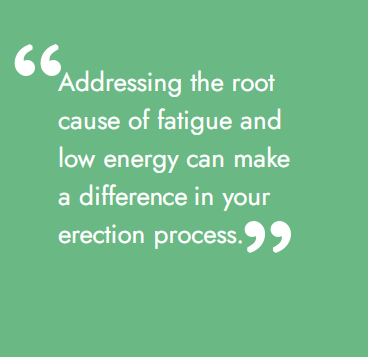Listen to Three Overlooked Erectile Dysfunction Categories through our podcast player above or read the transcript here [PDF].

Learning you have erectile dysfunction (ED) can be startling, upsetting and stressful. The early panic can cause a man to overlook some very important components of what is (or what is not) happening in his erection process. The details matter.
There are three primary manifestations of erectile dysfunction as outlined in the DSM-5. The DSM-5 is the diagnostic and statistical manual for mental health. In the section on sexual dysfunction the three different types of ED outlined are:
- Problems gaining an erection
- Problems maintaining an erection
- Decreased rigidity
In other words, not all ED is the same. Problems with erections can be very different between men and change over a lifespan. Knowing what is happening to you makes a difference. Those details may hold the key to understanding what is contributing to your ED. It can help you make it better or more manageable.
Try our eCourse: "The Thinking Man’s Guide to Understanding and Addressing ED"
Subcategories and Details
As we have established, no two situations are exactly the same. Within the three categories mentioned above there are more subcategories and details.
1. Trouble Gaining an Erection.
Solo activity: Some men will experience trouble gaining an erection when on their own or engaging in masturbation. They may even have a noticeable decrease in morning erections. Some men will have erection problems only during solo activity and will experience inadequate stimulation when engaged with a partner. However, in most instances, when a man struggles to achieve an erection on his own, he tends to struggle with his partner too.
Partnered activity: Commonly men can achieve an erection on their own but struggle with their partner. This is commonly driven by emotional discomforts including performance anxiety and can most commonly be resolved by addressing psychogenic components of ED.
2. Problems Maintaining an Erection.

Not maintaining an erection prior to activity: Some men will initially gain an erection but will lose it upon various forms of physical contact. Most commonly, men will lose the erection leading up to penetration. There can be physical and mental causes for this situation.
Not maintaining an erection during activity: Some men will gain and maintain an erection long enough to engage in sexual activity. Sexual activity can be solo or partnered and covers a range of stimulation including manual, oral, and penetration. During activity the erection can be lost due to factors different from those that cause the loss of erection prior to activity, or not being able to gain an erection in the first place.
3. Loss of Erection Firmness.
Decrease in firmness throughout the erection process: This experience is more likely to have specific physical components. If there are variations between partnered and solo activity, psychogenic factors are more likely to be involved with causing erection problems.
Decrease in firmness during sexual activity/penetration: Most commonly this will occur when transitioning from solo to partnered activity. The change in stimulation from self to partner can leave a gap in terms of needed stimulation and may account for the loss of firmness while engaging with a partner.
Some men experience all of these components at the same time. This complicates everything even more. Many men will have some of these components at different times or in different scenarios. Other men will only experience one of these manifestations consistently.
Here are three examples:
- A 41 year old male gains an erection without a problem but loses it when with a partner prior to penetration.
- A 25 year old male can gain and maintain an erection on his own but loses his erection during penetrative sex.
- A 57 year old male only experiences decreased rigidity. At times he struggles to maintain an erection on his own but he can consistently gain an erection.
All three of these men have ED. But do they sound the same to you? Are these manifestations uniquely different or are they all part of the same process?

There is no clear answer to this. Some men will have specific factors that can cause all three types of ED at the same time. However, if a man is experiencing one of these manifestations alone there may be unique factors that explain why he can gain but not maintain an erection or struggle to gain but maintain an erection once he has it.
Performance anxiety is likely to be present at the gaining stage of erections with a partner. It is understandable that a man may worry about getting an erection and relax upon achieving it, thereby allowing him to maintain it without a problem.
If a man can gain but struggles to maintain an erection, issues pertaining to stimulation and maintaining excitement may be more significant than performance. Yes, a man can get bored or distracted during sexual engagement and that can negatively impact maintaining an erection.
Rigidity can be impacted at various stages of an erection and may be driven by a number of unique factors. When a penis becomes less rigid it can be informative as to what psychogenic factors may be involved.
If you have ED it can be very helpful to identify the specific manifestations of your situation. The details can make a big difference. Medication can help mask some of the details as it can help override problems in all three of these categories. This may be why these distinctions are often overlooked.
If you want to get to the root of what is causing your ED this may be a helpful part of your exploration. It takes a calm head, time, and some reflection, but your erection process can benefit greatly.
Ready to Learn More?
To start your in-depth approach to resolving ED, try our online learning course called BEYOND THE LITTLE BLUE PILL, The Thinking Man’s Guide to Understanding and Addressing ED.
Ready to talk to an ED expert? Erection IQ founder Mark Goldberg helps men resolve erectile dysfunction. He offers individual, one-on-one services to men throughout the world through a secure, telehealth platform. It’s 100% confidential. You can visit the Center for Intimacy, Connection and Change website to schedule a free consult with Mark.
Subscribe to our Podcast
Listen to all Erectile Dysfunction Radio podcast episodes categorized by topic here, or find and subscribe to us for free on Apple Podcast/iTunes, Spotify and YouTube.
Article Updated – March 2021


